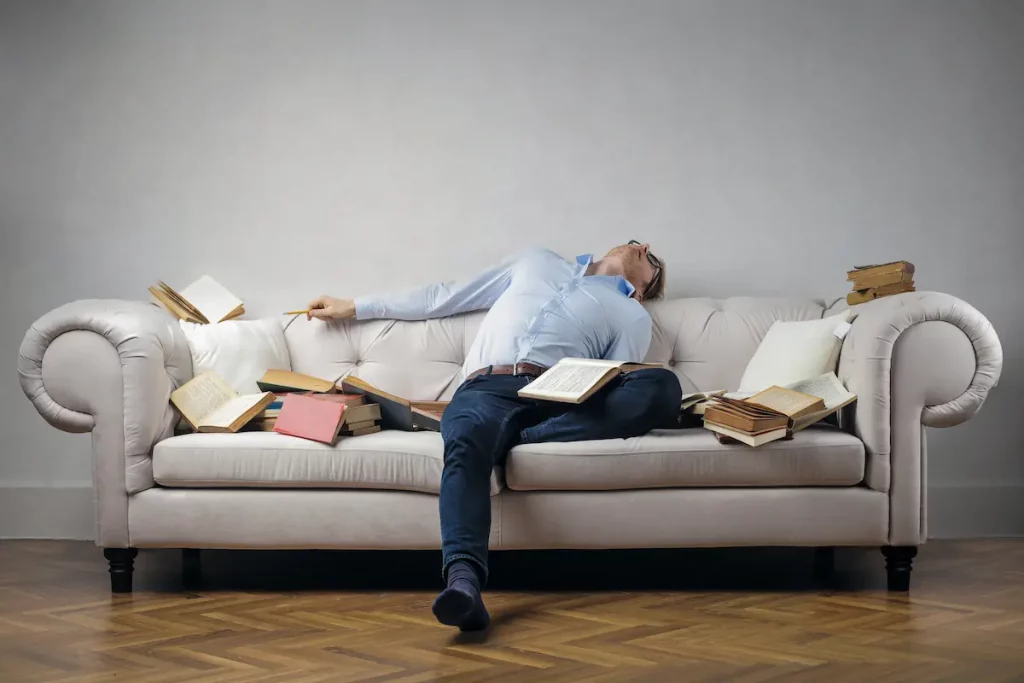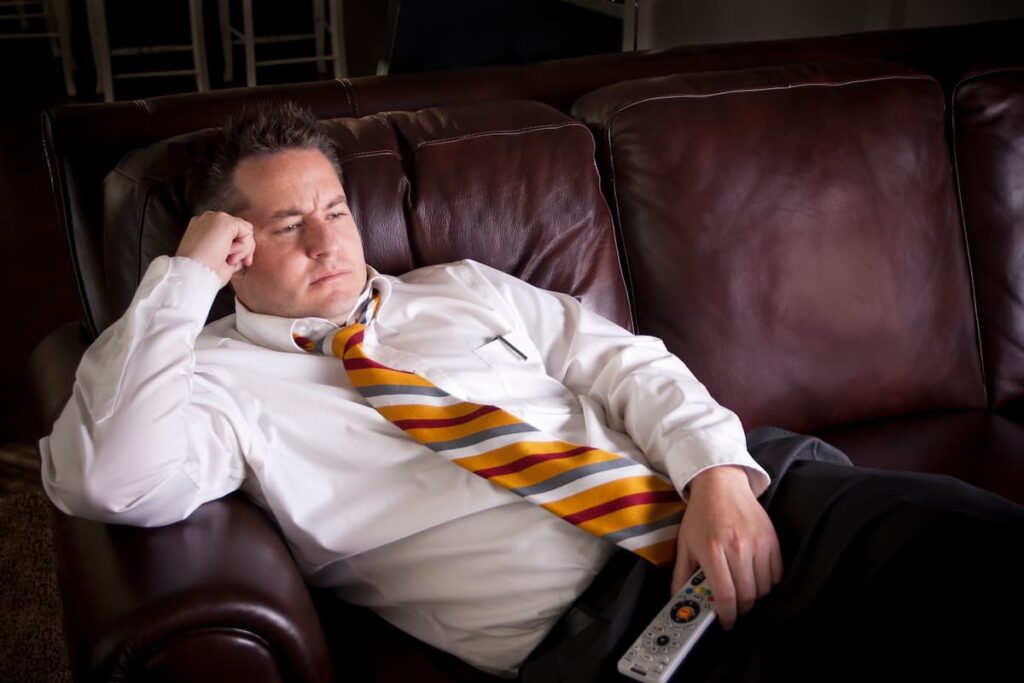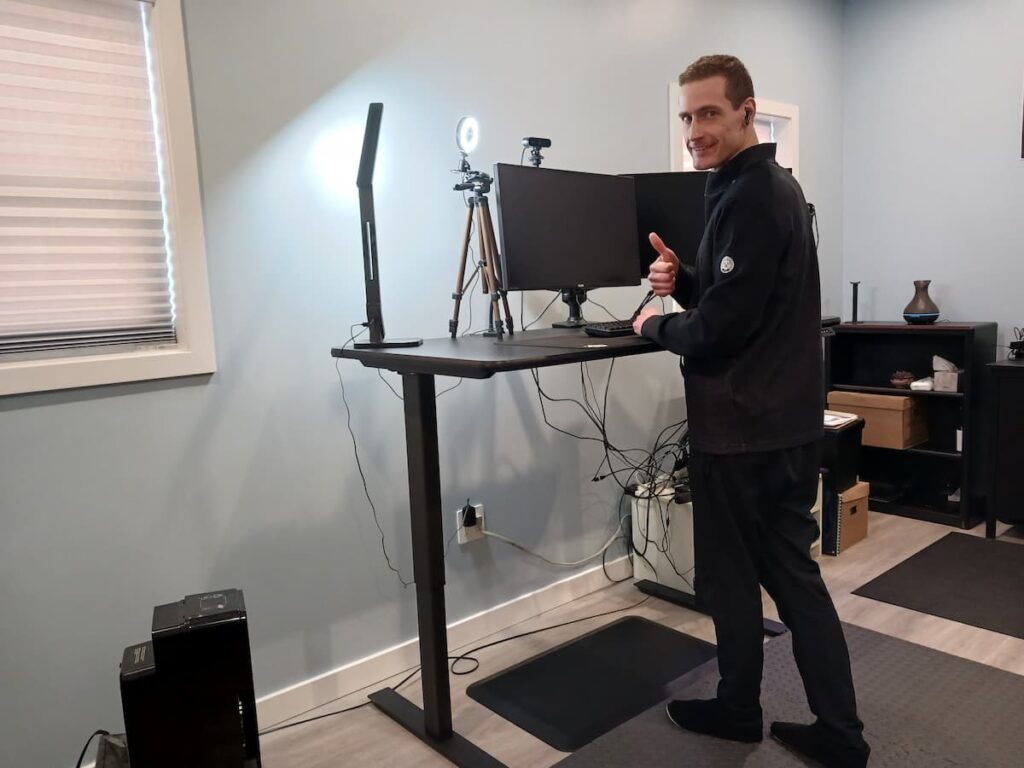Your husband may be napping all the time because he’s overworked, he’s trying to avoid his work responsibilities, he’s trying to avoid his familial responsibilities, his poor diet causes lethargy, he’s not physically active, he has an underlying health condition, or he’s suffering from depression.
As a partner, you’re naturally concerned when your husband sleeps all the time. His sleeping may be sounding alarm bells because you detect something is wrong. While sleep is healthy, excessive sleep is often a cause for concern worth looking into.
Let’s take a look at eight potential reasons your husband sleeps all the time and ways you can help him overcome his need to sleep excessively. After that, I’ve also put together some tips on how to improve sleep habits and sleep quality, and even share some personal habits that I have found helpful in my own life with regard to sleep.

Here are eight potential reasons why your husband sleeps all the time:
Husband Sleeps All The Time
1) Your Husband Is Overworked
Your husband is most likely under a lot of pressure. He has many responsibilities which may include:
- bills to pay
- having to perform well at work
- being a good husband
- spend time with the family
- being a good father
- looking after his parents
- connect with his extended family
- providing support for his friends
- traveling and/or commuting for work
- coaching sports teams and mentoring youth
Given the number of things on his plate, it is understandable that he may be overwhelmed and feel that sleep is the only time he is at peace.
Consider speaking to him about the pressures he faces and try to find ways that you can ease his burdens. Even if you are unable to help in a practical manner, he may just need someone to listen and empathize with him.
Be empathetic, ensure that he knows that you notice everything he does for you and the family, and appreciate his efforts. Making him feel valued will boost his spirits. If he feels appreciated, he may be encouraged to socialize more and be motivated to continue working hard.
2) Your Husband May Be Depressed
Excessive sleep is often an indicator of depression. If you suspect your husband may be suffering from depression, it is something critical to look into.
Depression often presents in lethargy, apathy, and withdrawal from life in general. Try to speak to your husband about his mental health. If it seems that he may be suffering from depression, it will be helpful for you to encourage him to seek the guidance of a psychologist and potentially a psychiatrist to prescribe him anti-depressants and any other medicine necessary.

3) Your Husband Sleeps To Avoid His Family Life
If your marriage has been under strain, it is highly possible that your husband is sleeping to escape fights, awkward silence, resentment, and frustration. He may be using sleep as a coping mechanism. It may be that he struggles to regulate his emotions in times of conflict. Perhaps he feels better once he wakes up, therefore turning to sleep to help him deal with his emotions.
It might be valuable for the two of you to collaborate on communication methods to try to promote effective conflict resolution.
Effective conflict resolution will enable him to regulate his emotions and prevent him from having to sleep to cope with his feelings.
4) Your Husband Is Sleeping To Avoid His Work Responsibilities
Given the Covid-19 pandemic, most companies are under a lot of pressure to keep their business afloat. It is likely that your husband is facing a lot of strain in the workplace as many industries are struggling and need their employees to put in extra effort to keep the business running.
The pressure he faces at work may be overwhelming him. He may feel that sleep allows him to escape from the harsh realities of his work environment, and for a few minutes, he is able to relax and forget all about the work he will have to do at a later stage.
Additionally, your husband may be facing the possibility of retrenchment. Many employees have been let go because companies are unable to maintain their salaries. Your husband could be concerned about being retrenched and is unable to cope with the possibility of losing his job, therefore turning to sleep to escape his anxious thoughts.
If you think his excessive sleep is work-related, the best thing you can do is ask him how you can help ease his burdens, show your appreciation for his hard work, and reassure him that your family unit will make things work if he is retrenched.
5) Your Husband Is Not Physically Active
If your husband has a sedentary job and does not engage in regular physical activities, it can negatively affect his energy levels. Exercising is a healthy way to promote overall health and increase energy levels in the long run.
Encourage your husband to engage in physical activities. Consider initiating romantic walks, even if they’re short ones, just to get his blood flowing and increase his heart rate.

Exercising releases various chemicals in the body that promote longevity and overall well-being.
6) Your Husband May Be Sick And Have A Health Condition Causing Fatigue
It is possible that your husband’s fatigue is health-related. If your husband has existing health conditions, these may be causing him to experience extreme fatigue. Consider consulting a medical practitioner to assess if his lethargy is health-related.
A medical practitioner is likely to be able to provide practical ways to promote energy, such as exercise, and also prescribe medication to promote an increase in his energy levels.
7) Your Husband Eats Foods And Drinks Beverages That Makes Him Lethargic
Diet largely impacts our energy levels. If your husband consumes carbohydrate-dense meals, unhealthy snacks, sodas, and alcoholic beverages, these are known for negatively affecting the body. These foods spike insulin levels and generally do not enable one to sustain their energy levels throughout the day.
If your husband has an unhealthy diet, consider encouraging him to eat healthily and support him in this regard.
Encourage him to eat high-fiber cereals, increase the number of fruits and vegetables he consumes, decrease his sugar intake, and increase his water intake.
These small changes will help provide him with energy throughout the day.
8) Your Husband Works Shift Work That Effects His Circadian Rhythm
If your husband works in an industry or sector that requires shift work, it is likely disrupting his natural circadian rhythm. Unfortunately, there’s not a lot that can be done about this outside of a career change, and that’s not an option for a lot of people and their current situations.

However, it’s something to be aware of and something to speak to a health professional about. There are still things in your husband’s control to help optimize his sleep habits despite working shift work, but it may require some additional lifestyle changes.
Remedies to Help Your Husband’s Sleep Habits
Here are some potential remedies that may help your husband improve his sleep habits and get back on track with a healthy circadian rhythm.
Physical Activity and Exercise
There is no denying it, we live in a time where being sedentary is almost viewed as “normal”. Our bodies are meant to move for so many reasons, and being sedentary can result in a lot of health and mental health consequences.
Your husband doesn’t have to start going to the gym and “get ripped”, but increased movement throughout the day can be an easy place to start. Most phones have a built-in health app to count steps and this is a great place to start.
Track it for a few days, then start increasing the number of steps slowly. Depending on what your husband’s schedule and time allows, aiming for 10,000 steps each day is sort of a “gold standard”. Again, however, this depends on available time.
In fact, I myself use a standing desk as much as I can throughout the day and find these simple yet gentle increases in movement significantly improve my ability to fall asleep and stay asleep at night.

Being sedentary has a lot of consequences, and poor sleep quality and habits is one of them. We’re meant to move (not necessarily go to the gym and be a “fitness model”) but it’s how our bodies are designed to work, so the more movement the better!
In fact, just a simple 10-minute walk after eating a meal can give us a lot of benefits like improving our digestion and blood glucose levels. One of the benefits of being remote and having a garage office is I can hope on a treadmill to conveniently accomplish this after eating. I find it especially helpful after eating a really big meal where I feel “stuffed”.
Improve Sleep Hygiene
Like many other lifestyle habits, this one may seem small and insignificant, but it’s the accumulation of all the “small things” that can lead to big changes in our lives and our sense of well-being.
Sleep hygiene is what we “do” and “do not do” prior to bed. It’s also our routine, and it can help signal to our brain it’s time to shut it down and go to sleep. During the Covid-19 pandemic, I found myself developing poor sleep hygiene habits, like being on the computer until late at night or watching TV right before bed.
Once I developed (and tweaked a bit) my sleep hygiene habits, my sleep has been consistently getting better, and I feel better because of it.
Healthy Sleep Hygiene Habits
- avoid day time naps (if you must, no longer than 20-minutes)
- stay consistent with going to bed and waking up times (including weekends!)
- maintain a bedtime routine, for example:
- turn off TV
- dim lights
- cool the temperature a few degrees if possible
- brush teeth
- light stretches or yoga poses for a few minutes
- read a book (not a device/screen)
- lay down
Unhealthy Sleep Hygiene Habits
- Using screens prior to bed
- Eating a large meal prior to sleep
- Consuming alcohol or other substances before bed
- Intense exercising right before bed
- Consuming caffeine or other stimulants (it’s not just in coffee!)
I have also found that ear plugs and a sleep mask have helped me a lot in falling asleep after laying down, it’s part of my sleep hygiene now. I will warn you, however, that once you start this habit, it’s very difficult to go back. When I travel and forget my sleep mask and earplugs, I get a little anxious that I won’t have a great sleep…

Hydration
It’s important to stay hydrated. Back when we were “cave people” all we had available was water. Now, people find water to be “boring” and instead opt for other beverages throughout the day.
There’s nothing wrong with enjoying what you’re drinking now and then, especially as a treat. But we need a lot of water, and if you’re active, even more.
One reason your husband may be finding himself napping throughout the day is fatigue from dehydration. If he doesn’t drink a lot of water and drinkings dehydrating beverages like coffee and alcohol, he’s likely dehydrated.
Since I work from home I have started using one of those “obnoxious” 1-gallon water bottles. I even add electrolyte supplements to it like potassium, sea salt, and magnesium (I geek out on this stuff…).
I wouldn’t take this water bottle out with me to carry around, but I will use it to fill up smaller-sized ones when heading out of the home, especially to places like the park with my daughter.
But I have found having this around me all day is a consistent reminder to stay hydrated. And since I do enjoy the benefits of caffeine and am fairly active, I find myself consuming the entire gallon each day (it’s kind of like a daily challenge for me).
It’s easy to become dehydrated. Whenever I travel and stop my hydration routine I can really notice how it affects me and my overall well-being.

Important note: You have to find the right balance with hydration, however. When I started consistently drinking more water, I also found myself waking up in the middle of the night to urinate. Since we’re trying to improve sleep here, I thought I should mention this. You’ll have to experiment of when the best “cut off” time is for drinking water. For me, personally, it’s around 60-90 minutes prior to bedtime.
Another benefit I like about it is that because the opening is so large, it’s really easy to clean with a standard dish scrubber.
Supplements
Our modern world offers a lot of conveniences, especially for things like food and nutrition. Because of these conveniences, however, we may find ourselves lacking in certain micronutrients and vitamins, some of which are necessary for good sleep.
I don’t want to offer medical or health advice here as it’s outside of my professional abilities and would be unethical, but I’m happy to share what I’ve tried and have found helpful for me. However, each individual is different, so it’s recommended you speak with your physician and do your own due diligence in research.
I mentioned above that I add electrolytes to my water and one of them is “food-grade Epsom salts”. The benefit of this is that it contains magnesium, and most people, on average, don’t get enough of this. However, magnesium can be helpful for getting quality sleep.
I also heard one time that cherries, the fruit, contain some “stuff” in them that can help with sleep. Since I use a soda stream for sparkling water, I created a “bedtime” drink with sparkling water and a splash of cherry concentrate/extract juice.
It turns out, that cherries actually have a high amount of melatonin, which brings me to the next supplement I use occasionally…melatonin. I’m weary of ever suggesting this as a lot of people become almost “dependent” on melatonin, or it becomes just part of their sleep routine and hygiene. However, if you read a melatonin supplement packaging container, it’s never advised to use it long-term.
So I use these sparingly, like when I’m dealing with jet lag or have had late bedtimes recently due to unavoidable life circumstances.
Lifestyle Changes
This one is big and takes a lot of effort and consistency. However, poor sleep habits and sleep quality can often be the result of one’s lifestyle. If you find yourself constantly drained due to the demands and responsibilities in your life, it may be worth “tweaking things”.
Humans aren’t robots, we can only handle so much work and stress. Our bodies also don’t know the difference between different stressors, it’s just stress. Common stressors in one’s life may include:
- Interpersonal relationships (family, friends, etc.,)
- Your work life
- Commuting on busy highways
- Social commitments outside of family/work life
- Being sedentary
- Poor diet
If your husband is “pulled” in all of these directions and doesn’t have a lot of time for self-care and to recharge, then he is likely in a consistent state of burnout, which can have a big impact on sleep quality and sleep habits.
However, I want to validate that changing aspects of our lifestyle is difficult, so it may be worth suggesting your husband work with a professional, like a therapist or life coach, to make these big changes.
Once the changes are made, however, the benefits from them often keep people on track as they realize how much better they feel when they aren’t overworked and consistently stressed out.
Conclusion
Your husband may be sleeping all the time because he is under pressure and sleeps to avoid all his responsibilities. He may also be sleeping all the time as a result of depression, underlying health concerns, or lethargy arising from poor diet.
Your husband, however, has most likely had a time in his life where he didn’t sleep all the time, which is proof that he has the capacity to. It will take some intentional effort and behavioral changes, but once they are made, the benefits will likely outweigh the “work” perceived by making them. So, in a nutshell, there is hope! I hope you and your husband can soon get back to a healthy sleep routine and reap the benefits of his improved well-being.

